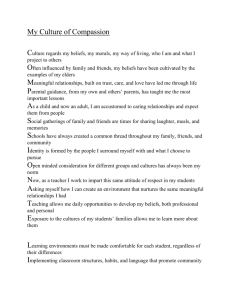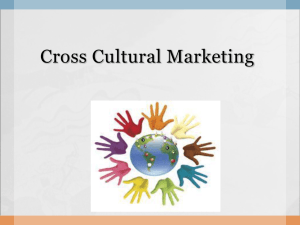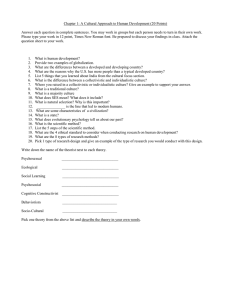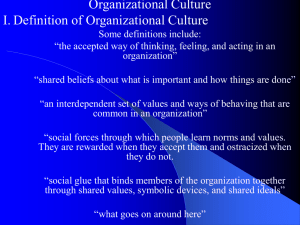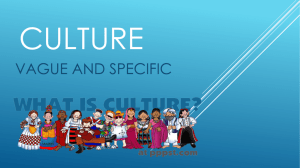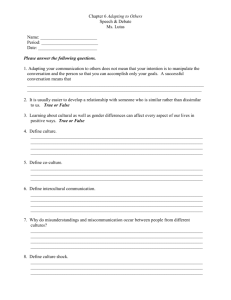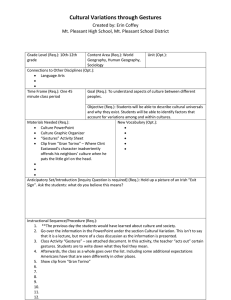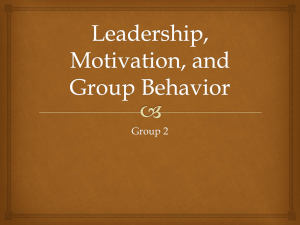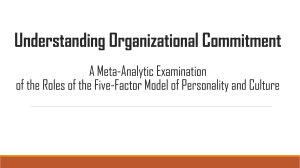Culture and Management
advertisement
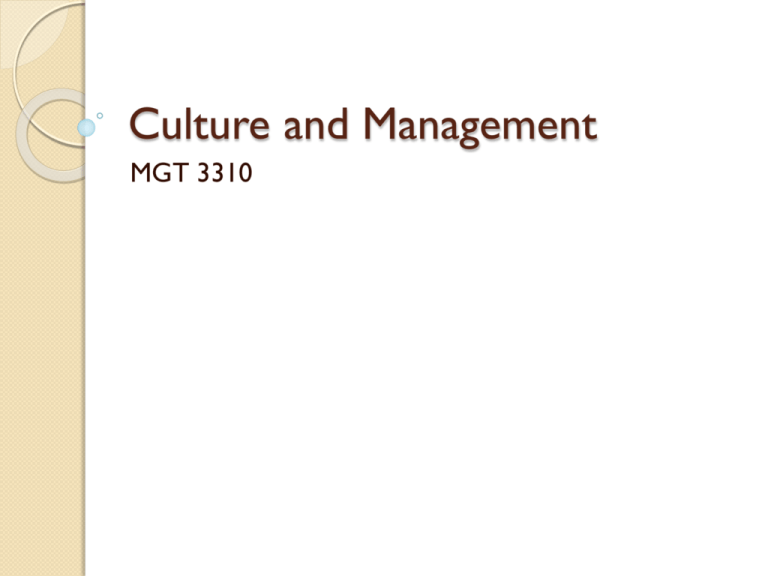
Culture and Management MGT 3310 Background Globalization ◦ Production Collaboration Diversity ◦ Employees from different culture World Market ◦ Different taste from different culture Culture • • • • Culture refers to the beliefs, values, behavior and material objects that, together, form a people's way of life. Culture determines how we view the world around us Culture includes the traditions we inherit and pass on to the next generation Culture: totality of our shared language, knowledge, material objects, and behavior © Copyright 2010 Alan S. Berger 3 Characteristics of Culture Culture is shared. 2. Culture is learned. 3. Culture is taken for granted. 4. Culture is symbolic. 5. Culture varies across time and place. 1. Norms Specific cultural expectations for how to behave in a given situation. A society without norms would be in chaos; with established norms, people know how to act, and social interactions are consistent, predictable, and learnable. Social sanctions are mechanisms of social control that enforce norms. Beliefs Shared ideas people hold collectively within a culture. Beliefs are the basis for many of a culture’s norms and values. Beliefs orient people to the world by providing answers to otherwise imponderable questions about the meaning of life. Values Abstract standards in a society or group that define the ideal principles of what is desirable and morally correct. Values determine what is considered right and wrong, beautiful and ugly, good and bad. Values can provide rules for behavior, but can also be the source of conflict. Languages Language Percent of World Population Mandarin 12.44% Spanish 4.85% English 4.83% Arabic 3.25% Hindi 2.68% Bengali 2.66% Portuguese 2.62% Russian 2.12% Japanese 1.80% German 1.33% Religions Five largest religions % of world population Christianity 33% Islam 19.6% Hinduism 13.4% Chinese folk religion 6.4% Buddhism 5.9% Cultural Dimensions Geert Hofstede’s work in IBM ◦ ◦ ◦ ◦ 1978-83 More than 100,000 employees 53 countries Highlight essential patterns of thinking, feeling, and acting ◦ Five Dimensions individualism, masculinity, power distance, and uncertainty avoidance, long-term orientation Power Distance Power Distance reflects the degree to which a culture believes how institutional and organizational power should be distributed (equally or unequally) and how the decisions of the power holders should be viewed (challenged or accepted). ◦ Climate, measured by geographical latitude. Cultures in high-latitude climate (moderate or cold climates) tend to have low PDI scores. Cultures that have tropical climate tend to have high PDI scores. ◦ Population. Generally, the more people within the culture, the greater the power distance is likely to be. ◦ Distribution of Wealth. The more unequally the wealth is distributed within a culture, the greater the culture's power distance. Individualism Versus Collectivism Individualism-Collectivism describes the degree to which a culture relies on and has allegiance to the self or the group. ◦ Economic development. Wealthy cultures tend to be individualistic, whereas poor cultures tend to be collectivistic. ◦ Climate. Cultures in colder climate tend to be individualistic, whereas cultures in warmer climates tend to be collectivistic. Masculinity Versus Femininity Masculinity-Femininity indicates the degree to which a culture values such behaviors as assertiveness, achievement, acquisition of wealth or caring for others, social supports and the quality of life. ◦ Members of high MAS cultures believe that men should be assertive and women should be nurturant. Sex roles are clearly differentiated, and sexual inequality is seen as beneficial. Uncertainty Avoidance Uncertainty Avoidance refers to the extent to which a culture feels threatened by ambiguous, uncertain situations and tries to avoid them by establishing more structure. ◦ The fundamental issue here is how a society deals with the fact that the future can never be known: should we try to control the future or just let it happen? Long-term VS. short-term orientation Confucian Dynamism by Michael H. Bond Later work with Bond produced another dimension meant to explain the rapid economic development of many Asian countries. Long-term VS. short-term orientation Societies with a short-term orientation generally have a strong concern with establishing the absolute Truth. They are normative in their thinking. They exhibit great respect for traditions, a relatively small propensity to save for the future, and a focus on achieving quick results. In societies with a long-term orientation, people believe that truth depends very much on situation, context and time. They show an ability to adapt traditions to changed conditions, a strong propensity to save and invest thriftiness, and perseverance in achieving results. Limitations Culture is stable ◦ Challenged by Ralston et al. (1999)’s research which compared three generations in China and showed that Chinese managers are becoming more individualistic, less collectivistic, and lower in Confucian dynamism. Organizational Culture VS. National Culture Culture-free approach Ignore important characteristics of culture such as religiosity, language, historicity GLOBE project ◦ “Should be” ◦ “As is” Argentina It is rude to ask people what they do for a living. Wait until they offer the information. Bahrain Never show signs of impatience, because it is considered an insult. If tea is offered, always accept. Cambodia Never touch or pass something over the head of a Cambodian, because the head is considered sacred. China As in most Asian cultures, avoid waving or pointing chopsticks, putting them vertically in a rice bowl or tapping them on the bowl. These actions are considered extremely rude. Dominican Republic When speaking to someone, failure to maintain good eye contact may be interpreted as losing interest in the conversation. France Always remain calm, polite and courteous during business meetings. Never appear overly friendly, because this could be construed as suspicious. Never ask personal questions. Greece Egypt If you need to signal a taxi, holding up five fingers is considered an offensive gesture if the palm faces outward. Face your palm inward with closed fingers. Showing the sole of your foot or crossing your legs when sitting is an insult. Never use the thumbs-up sign, because it is considered an obscene gesture. India Avoid giving gifts made from leather, because many Hindus are vegetarian and consider cows sacred. Keep this in mind when taking Indian clients to restaurants. Don't wink, because it is seen as a sexual gesture. Japan Never write on a business card or shove the card into your back pocket when you are with the giver. This is considered disrespectful. Hold the card with both hands and read it carefully. It's considered polite to make frequent apologies in general conversation. Malaysia If you receive an invitation from a business associate from Malaysia, always respond in writing. Avoid using your left hand because it is considered unclean. Mexico If visiting a business associate's home, do not bring up business unless the associate does. Philippines Never refer to a female hosting an event as the "hostess," which translates to prostitute. Singapore If you plan to give a gift, always give it to the company. A gift to one person is considered a bribe. Spain Always request your check when dining out in Spain. It is considered rude for wait staff to bring your bill beforehand. Vietnam Shake hands only with someone of the same sex who initiates it. Physical contact between men and women in public is frowned upon.

